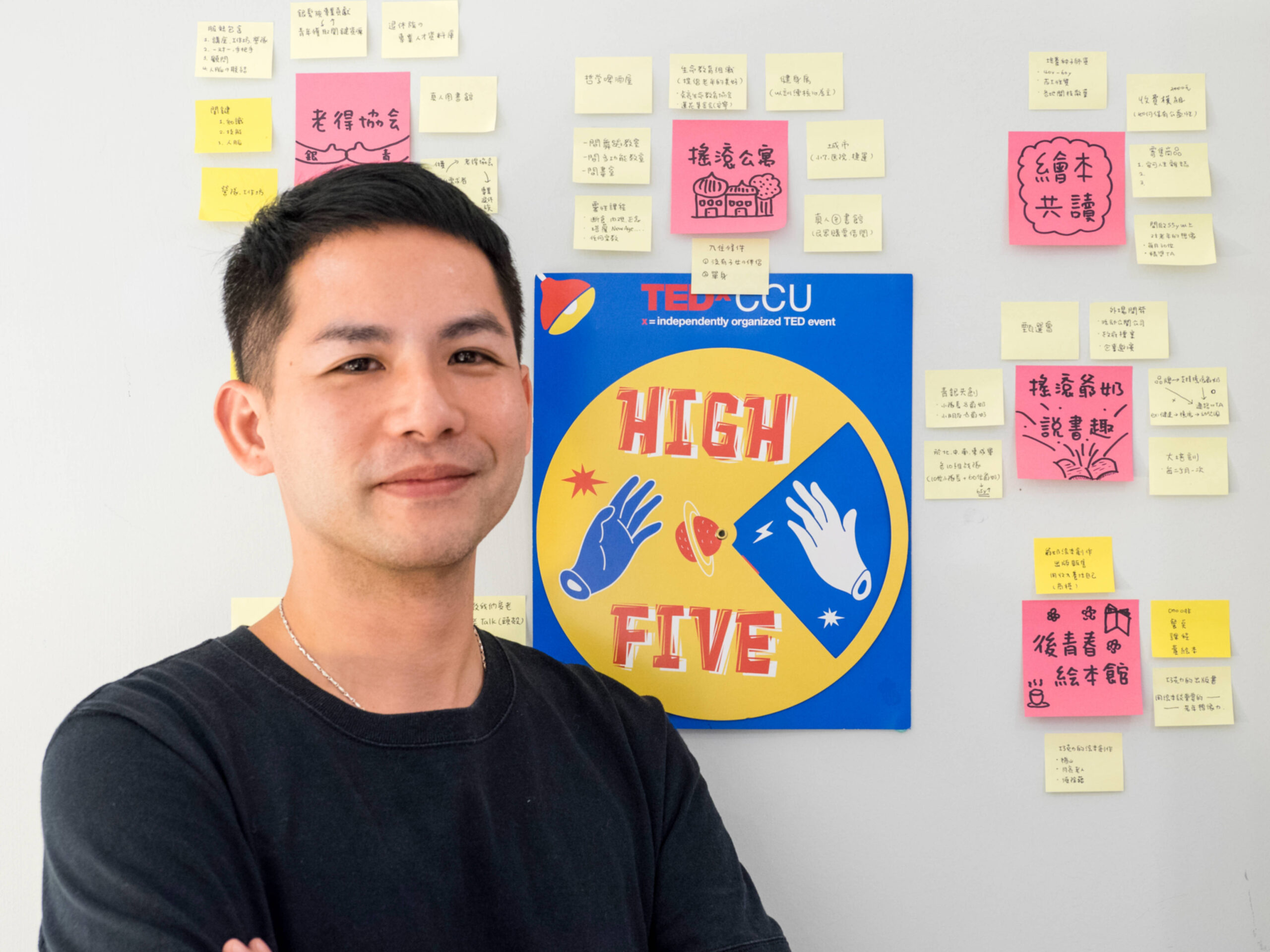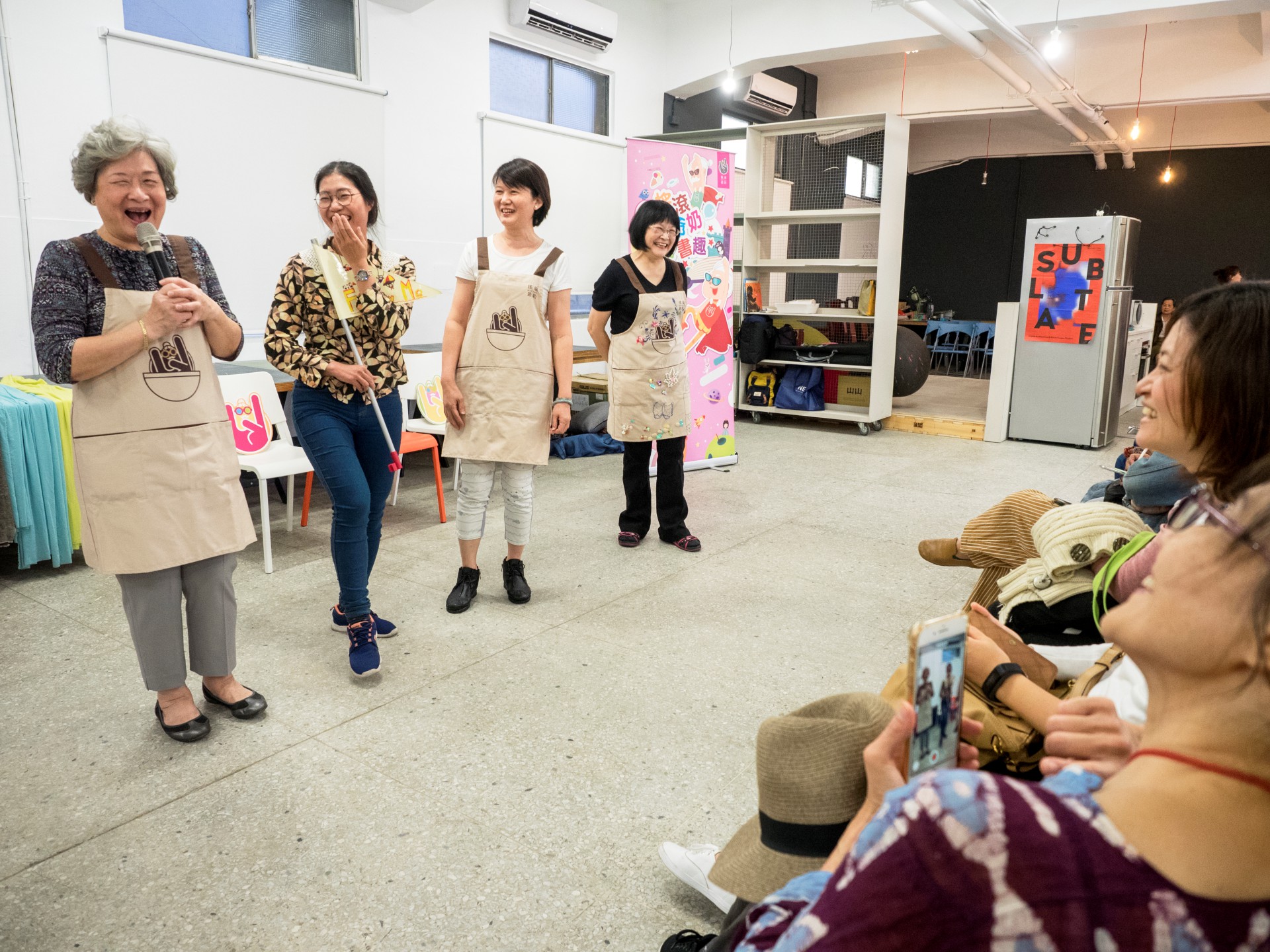你害怕變老嗎?根據統計,2025年臺灣達65歲以上人口將達到總人口的20%,相當於每五人就有一位銀髮長者,正式邁入超高齡社會。這對我們的生活有什麼影響?勞基法的法定退休年齡為65歲,內政部2018年公布臺灣的國民平均壽命已達到80歲。保誠人壽「理想的退休生活」調查顯示,近七成民眾希望能在60歲前退休。1若以臺灣人的平均壽命80歲減去希望退休的年齡60歲,等於大約擁有20年的退休時光。
這份調查只關注退休金與費用支出排名(醫療健保、旅遊休閒及安養機構費用支出)的調查,卻沒有調查國人退休生活的具體模樣可以是什麼樣子,是選擇提早退休後,再次投入職場;是參與志工服務或是樂得含孫弄飴;還是擔任家庭中照顧者角色,與爸媽一樣的方式變老?或是有可能創造一種不只是以家庭為單位,而是以社會為單位,透過與長者交往,以青銀共學的方式一起變老?
搖滾爺奶創立人林宗憲(巧克力)畢業於臺灣藝術大學戲劇與劇場應用學系,現就讀政治大學教育系教育心理與輔導組博士班。他在2005年創立「故事島.兒童故事屋」,將戲劇結合教育應用在故事屋,經營十年後,因少子化而學員不足於2015年結束。2015至2017年,林宗憲在揚生基金會擔任高齡者說故事訓練講師,協助長者發展人際互動,才第一次接觸到熟齡族群,開始關注高齡議題。
他發現高齡人口中其實只有兩成比例會用到長期照顧,換句話說有八成是健康的,不是所有人都會失智與失能。台灣2016年的總自殺人口,有25.9%是65歲長者,高齡族群憂鬱情況偏高,因此如何促進高齡族群心理健康,帶領高齡族群走入社會,創造青銀交流的機會,一起嚮往美好的老年生活,也成為他關注的重點。
 搖滾爺奶創立人林宗憲。圖/許斌攝影
搖滾爺奶創立人林宗憲。圖/許斌攝影
基於對教育與說故事的熱情,以及有一種對於老年生活的想像是覺得即使成為爺爺奶奶也可以活得很搖滾,林宗憲於2017年創立搖滾爺奶社會企業,以故事繪本帶領熟齡族群創造持續融入社會的有機進行式。在臺灣逐步邁入高齡化社會之時,「銀髮人力活化、老有所用、退而不休」是他創業的期望與目標。以正念(Mindfulness)為核心方法,透過「繪本共讀」與「說書戰隊」,提供50到85歲熟齡族各式動能技術訓練與心理健康促進。培訓樂齡以繪本說故事,創造他們的自我價值與社會參與,實現搖滾爺奶式的青銀共創。原本搖滾爺奶只是培訓高齡者說故事,卻開啟了友善的社會企業經營模式,首先著重如何解決社會問題,創造社會影響力,在營利的同時也讓社會更快樂和諧。
社企公司以「繪本共讀」作為付費的教育課程創造盈餘,提供給50歲以上的熟齡族開啟對老年的想像。一堂課三小時,一個月一梯次提供三堂課,共讀六本繪本。林宗憲在繪本選擇上也相當用心,談成長、談創意、談死亡,談快樂地變老。他會選談論長者們所忌諱死亡議題的《天堂筆記本》,也從《雲上的阿里》延伸討論如何設計自己的墳墓;《拼被人送的禮》提醒我們不是變老而是還在長大(Grow old);以及《阿茲海默先生》與《命運書》等等。過程中注重故事的轉化應用,透過繪本主要實現三個目標:去標籤,擺脫長者囉唆嘮叨的形象;談夢想,使長者學習放開心胸接受新事物;放下執著,減低長者憂鬱與煩惱。
熟齡族透過「說書戰隊」進行社會參與,不只有機會接觸人群,同時也強化心理健康,走出自己的舒適圈與人群互動,過程中學習了遊戲帶領技巧、肢體開發訓練與想像力開發。目前說書戰隊共有六個小隊,小隊長(共同創業夥伴)由20至40歲的青壯年組成,每隊有七位爺奶,由小隊長帶領「搖滾爺奶說書趣」的公開活動。不設限觀眾年齡,0到99歲都可以參與,開啟大眾對老年的想像。繪本共讀與書戰隊兩者不太一樣,一個是透過繪本重新想像世界;一個是透過表演創造繪本中的世界。這像是邁向另一個角色的基本門檻,從共讀到說書,在過程中學習如何成為說故事的表演者,不特別扮演其他角色,而是透過說書將繪本故事傳遞出去。至少要半年時間,才有可能成為說故事的人。每次演出後,小隊長會針對當日爺奶們的演出認真地做「筆記」。每兩個月,固定班底會有一次整日免費的大培訓。林宗憲設計課程的目的不是要訓練出專業表演者,而是要訓練長者的彈性與靈活性,以及對說故事的專業性。爺奶透過說書也會得到20分鐘300元的「打工」收入。參與說書的爺奶並不是強制性的,隨時可以退出小隊。林宗憲說:「這群爺奶其實非常勇敢,站在第一線勇於面對不同年齡層觀眾的反應與回饋,不論好或壞,可以想像他們面對演出的心理壓力。」
 搖滾爺奶於「戲遊銀髮:劇做老年田野方法論壇」中的演出片段,快樂奶奶、蝴蝶奶奶與寶貝奶奶分享自己的老年生活經驗。圖/許斌攝影
搖滾爺奶於「戲遊銀髮:劇做老年田野方法論壇」中的演出片段,快樂奶奶、蝴蝶奶奶與寶貝奶奶分享自己的老年生活經驗。圖/許斌攝影
在空總臺灣當代文化實驗場舉辦的「戲遊銀髮」活動中,搖滾爺奶將平常約一個小時的演出濃縮成半小時,由小隊長丸子帶領三位奶奶:快樂奶奶、蝴蝶奶奶與寶貝奶奶,由她們先介紹自己與分享老年的生活經驗,比如孫子講「洗臉」結果因重聽聽成「幾點」的生活小故事。接著丸子將參與者分成三組,各自聽奶奶說故事。筆者參與到的繪本是《一直一直往下挖》,寶貝奶奶在翻閱繪本說書的同時,也搭配生動的肢體語彙。繪本故事說完後,邀請參與者身體動起來:「過河」由奶奶當鱷魚阻擋觀眾過河;「走懸崖」用一直線體驗走懸崖時身歷其境的驚恐(輕輕或用力搖晃觀眾);「過山洞」則是與大家一起搭橋過山洞,偏偏山洞又弄得特別低。奶奶透過這些情境設計和參與者建立身體的互動關係。
在綜合討論中,快樂奶奶提到她最早是參與揚生基金會的繪本說故事訓練才認識林宗憲老師,那時候主要是對著幼稚園的小朋友說故事。她提到對小朋友說與對成人說故事是不一樣的,小朋友非常純真,成人則無法看透他們內心的想法。今天是她第一次對大人說故事,來參加工作坊前覺得壓力蠻大且擔心,然而筆者還是可以感覺到奶奶們的從容與自信。小隊長丸子也做了分享,她的隊上固定有七位爺奶,她認為說故事讓爺奶可以接觸到不同的人,他們會在咖啡店、書店、百貨公司等公共場所說故事,觀眾普遍以親子居多,她很佩服爺奶們的勇氣,搖滾爺奶做的即是幫助經營團隊建立與群眾真實交流的場域與機會,去除大眾對長者的刻板標籤。
林宗憲從不過問這些爺奶的背景與隱私,其中有許多爺奶是事業有成的退休人士,屬中產階級以上的高知識分子,擁有較高的社會經濟地位。他們從職場與家庭退休後,在搖滾爺奶共同開啟老後的第三人生(The Third Act),林宗憲以正向心理學的方式帶領長者們一起學習在地變老,讓他們學習更愛自己。他分享過去經營兒童教育與樂齡教育市場兩者的經驗,搖滾爺奶受到更多的認同與支持。林宗憲認為長者應該回到社會,進行世代交流,不只是讓社會大眾重新看待老年生活,其實也是關乎所有人的事。如何改善硬軟體設備對長者的不友善、如何改變社會缺乏同理心、如何破除老人歧視、如何讓社會更健康更友善,都是他持續關注的。
搖滾爺奶目前的經營模式不走補助申請,除了企業認購邀演,主要以繪本共讀為主,近期還增加了手作羊毛氈課程,來訓練長者的專注力。在辦公室的牆上,看到貼滿許多便條紙的夢想牆。走近一看,仔細寫著對搖滾爺奶未來輿圖的想像:繪本共讀、搖滾爺奶說書趣、後青春繪本館、老童話論壇劇場、老頭殼(Talk)講座、高齡課程、老得協會、搖滾公寓等等。已實踐的繪本共讀與說書趣,以及正在實踐的老得協會籌備招募,持續朝著未來期許前進,一如後青春繪本館的其中一項願景,即是爺奶的繪本創作。林宗憲認為長者才是最有故事的人,他希望未來能與爺奶們一起共同創作,出版屬於搖滾爺奶的繪本故事。